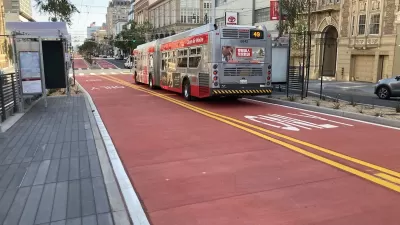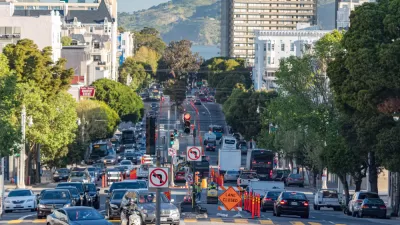The Van Ness Avenue Bus Rapid Transit project will bring the first dedicated BRT corridor to San Francisco, nearly two decades after voters approved the project.

The San Francisco Municipal Transportation Agency (SFMTA) Muni and Golden Gate Transit recently conducted testing for the Van Ness Bus Rapid Transit (BRT) corridor, according to an article in Mass Transit. "The testing included emergency turns and maneuvers, repositioning buses, verifying signals are working, clearances between passing buses and safe turns while bike racks are deployed." Traffic engineers also tested traffic and transit signals and reviewed street markings for any needed adjustments. Staff will be trained to drive buses on a BRT line, a skill new to most Muni operators. Officials say the BRT line and associated improvements will reduce congestion and improve the speed and reliability of bus travel on Van Ness Avenue.
Last November, an article by Carl Nolte outlined the long history of Van Ness Avenue as one of San Francisco's major thoroughfares, a "grand boulevard" that later became the city's Auto Row. Today, the street serves as a major north-south arterial. The Van Ness line, San Francisco's first BRT corridor, is scheduled to open this spring after almost two decades of delays. Initially approved by voters in 2003, the project did not break ground until 2016. As stated by SFMTA, "The planned improvements are expected to cut travel times for Golden Gate Transit and the 47, 49 and 90 Muni routes by 32 percent."
FULL STORY: Bus testing on the new Van Ness BRT corridor a success

Planetizen Federal Action Tracker
A weekly monitor of how Trump’s orders and actions are impacting planners and planning in America.

Congressman Proposes Bill to Rename DC Metro “Trump Train”
The Make Autorail Great Again Act would withhold federal funding to the system until the Washington Metropolitan Area Transit Authority (WMATA), rebrands as the Washington Metropolitan Authority for Greater Access (WMAGA).

The Simple Legislative Tool Transforming Vacant Downtowns
In California, Michigan and Georgia, an easy win is bringing dollars — and delight — back to city centers.

The States Losing Rural Delivery Rooms at an Alarming Pace
In some states, as few as 9% of rural hospitals still deliver babies. As a result, rising pre-term births, no adequate pre-term care and "harrowing" close calls are a growing reality.

The Small South Asian Republic Going all in on EVs
Thanks to one simple policy change less than five years ago, 65% of new cars in this Himalayan country are now electric.

DC Backpedals on Bike Lane Protection, Swaps Barriers for Paint
Citing aesthetic concerns, the city is removing the concrete barriers and flexposts that once separated Arizona Avenue cyclists from motor vehicles.
Urban Design for Planners 1: Software Tools
This six-course series explores essential urban design concepts using open source software and equips planners with the tools they need to participate fully in the urban design process.
Planning for Universal Design
Learn the tools for implementing Universal Design in planning regulations.
Smith Gee Studio
City of Charlotte
City of Camden Redevelopment Agency
City of Astoria
Transportation Research & Education Center (TREC) at Portland State University
US High Speed Rail Association
City of Camden Redevelopment Agency
Municipality of Princeton (NJ)





























